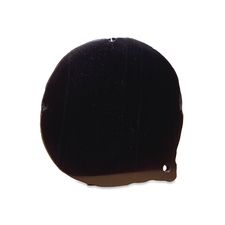 British museum
British museum
The Mexica people made mirrors of varying sizes with cut iron pyrites and obsidian (a volcanic glass).
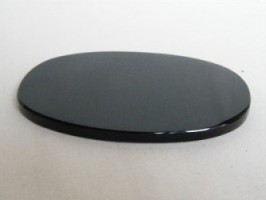
Armilla:
…combing their long hair at a mirror…
…to find new mirrors…
|
|
|
|
The Mexica people made mirrors of varying sizes with cut iron pyrites and obsidian (a volcanic glass).
Armilla: …combing their long hair at a mirror… …to find new mirrors… Hola Peter. Es curioso como en cada región del mundo, a cada población le toca una determinada suerte y se ve en la necesidad de actuar, implementar estrategias para resolver problemas y mejorar su situación. Lo que mencionabas al respecto de Los héroes nada más que piratas. Habrá sido difícil aventurarse a tal suerte y dirigirse a lugares no conocidos con el riesgo de perderlo todo, muy emocionante y vital también el poder abrir nuevas rutas de intercambio y dominio, para regresar con mas posibilidades de bienestar, de conocimiento para el grupo, la familia, etc. Eso ha sido mucho de lo que siempre ha sucedido en este planeta y es difícil imaginar que deje de suceder porque es algo muy esencial al hombre. Lo que si veo, es que parece que hoy existe mayor conciencia sobre las ventajas de realizar intercambios recíprocos y compartir beneficios, Pero siguen existiendo muchas injusticias en algunas partes. Para respetar los derechos de cada ser humano,tal vez tendriamos que ver a toda la humanidad como un grupo, como una familia. Estuve buscando de qué parte del Mundo eran las imágenes que me enviaste, debo reconocer que no tenía muy presente cuales eran las Colonias de los Países Bajos en el Oriente. Más bien si recordaba aquellas distribuidas en el Océano Atlántico, en las Antillas, en Sudamérica en Norteamérica. Comienzo a comprender, que lugar tan especial y estratégico, lleno de recovecos por tantas islas volcánicas y situado casi todo en línea con el ecuador, muy diferente de los Países Bajos. Es impresionante como en un tiempo tan breve todo el planeta quedo conectado, Aquí como parte de las expansiones españolas, la Nueva España fue el punto desde donde se pudieron establecer intercambios constantes con esa parte de Oriente un poco más al norte, otro archipiélago que se convirtió también en colonia española. Acabo de entrar a tu página y es muy agradable contemplar todos los objetos. Como el tema, la imagen fotográfica de cada serie, contiene una idea principal muy esencial que los engloba y lleva a meditar en diferentes direcciones desde los objetos. Son muchos trabajos y en todos, los elementos formales, los materiales, las articulaciones, están muy bien conjugados. También son muy útiles las medidas para imaginar los tamaños de los objetos. Me gusta como incluyes objetos que pertenecen a otra clase ,diferente a la de joyería, y luego como su función se vuelve más simbólica por el ligero cambio del tamaño para formar el objeto de joyería , relacionado con la idea principal de la serie. Tengo mas observaciones y preguntas al respecto que te enviare en el futuro Peter nos vemos pronto , te mando la imágen de este trabajo que realice en diciembre de 2006 para una exposición conmemorativa sobre la Virgen de Guadalupe
Buena suerte y que estés bien Hello Peter Is curious how each region of the world, each population got a specific luck and gets into the necessity to act, implement a strategy to resolve problems and improve his situation. What you said about, heroes nothing more than pirates , it had to be very difficult take the adventure going so far to unknown lands with the risk of loosing everything, very exciting and vital also to open new ways of exchange and power, to return with more possibilities of advantage, more knowledge, for the group, the family, etc. This had been much of what it always happen in this planet and is difficult to imagine that stops because is something very essential to human being. What I see now, is that it seems to be more consciousness of the advantages of reciprocate exchange and share benefits , but still being a lot of injustices in some places. to respect the rights of every human being, maybe we have to see the whole humanity as a group, as a family. I was trying to get from which part of the world were the images you send me I have to recognize that was no to much present to me where were the Netherlands Colonies in Orient. Much better, I remained that ones into the Atlantic Ocean in: The West Indies, North America, South America. I began to understand, what a estrategy and special place ,so full of ins and outs because of the volcanic islands ,aligned with the equator, so different to Netherlands. Is amazing how in a sow short time, the entire planet was connected. Here, as part of the Spanish expansions, the New Spain was the point from where has established a constant exchange with that part of Orient , an other archipelago a bit more at the North of the Netherlands Indies I enter into your page and am very pleasant to look all the objects. How the theme, the photographic images of each series has a principal idea that lumped together and takes you to meditate in different directions from the object. They are many works and in all cases, the formal elements, the materials, the articulations are very well conjugate. Also is very useful to see the size of the objects and imagine them. I like how you include objects that belongs to a different kind of jewelry ones , and how their function became more symbolic because of the slight change of size to form the jewelry objects, related with the principal idea of the series. I have more observations and questions about it, that I will send you in the future. See you soon Peter, I send you this image of a work I have done in December of 2006 for a commemorative exhibition of the Guadalupe Virgin.
Good luck and be fine Migración esta ligado con supervivencia, migro luego perduro – Dijo una mariposa monarca - Migran las poblaciones y migran las ideas buscando nuevos y mejores espacios donde desarrollarse, alimentarse, reproducirse, refugiarse o crecer. Los trabajadores mexicanos, turcos, españoles, griegos, africanos, entre otros, que traspasan las fronteras para buscar un empleo, funcionan básicamente por el mismo principio: subsistir. Supervivencia es permanencia, es dejar un legado, es trascender. Caminar el área gris es una forma de trascendencia: nuestras ideas viajan – gracias al Internet – son vistas y oídas para regresar nuevas y revitalizadas; así sucesivamente hasta lograr un objeto, resultado de esa migración. Una poco de historia… Jantje: … por los altoparlantes se escucha una vos de mujer que dice: abróchense los cinturones, nuestro viaje comienza…
Migration is linked to survival, I migrate therefore I endure – said a monarch butterfly - Populations migrate and ideas too, seeking new and better spaces to thive, feed, breed and grow. Mexican, Turkish, Spanish, Greek and African workers among others that cross the borders to find a job, do it basically for the same principle: survival. Survival is permanence, to leave a legacy, to transcend… Walking the gray area is a form of transcendence: our ideas travel – thanks to the Internet – they are seen and heard, only to return renewed and revitalized in an ongoig process to finally become a new object, as a result of that migration. A little history … Jantje: … Through loudspeakers we hear a woman say: fasten your seat belts, our journey begins…. Andrés
In my Studio Me dear natalie http://www.goear.com/listen/10560a1/bello-barrio—mauricio-redoles-mauricio-redoles I know it´s in Spanich… but let see what happend warmest nano
Hi Andrea You are right doing a relation between the Quipus and the carpets! Its very interesting to find some similitude between different cultures, and historic periods. Knots are the base of many textiles, and also the base of a lot of mountain and sailing apparel. How can we communicate now trough them? Using thread to repair our clothes by ourselves? knotting our hair with rastas? Knotting handkerchief often to remember? (I know the expression, but I can’t find a phrase in Spanish to say it). Knots to remember. Knots to tell, to count, to fix, to join…. Knots to unknot? *I found this objects ( 1_3) on the street some days ago. Beautiful knots. 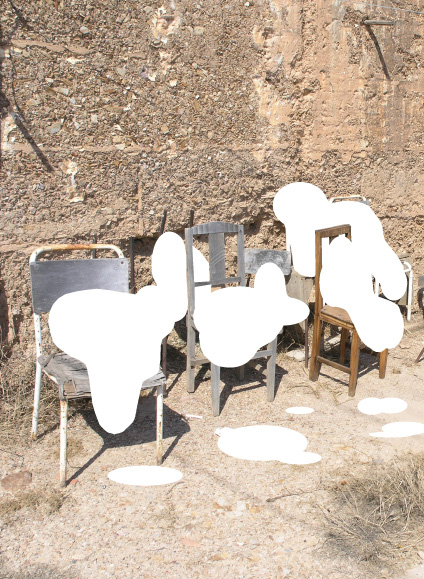 illustration, LH 2009 I see you are a lover of sewing too (or maybe just do it out of necessity…)! It’s exactly these funny overlapped sewing patterns that I also think of in regards to cultural behavior patterns or movements in life. In Germany they are the ‘famous’ BURDA sewing patterns from the do-it-yourself fashion magazine with the same name. You go crazy trying to make sense and unravel them! All these years I have been holding on to a piece of one, and it’s been stuck to my studio wall for ages and inspiring different thoughts. I also love those little drawings demonstrating the different pattern pieces on the back. I also really love the idea of the Quipus, very exciting. And the first thing that popped into my mind in connection with the talking knots was how carpets are knotted too and usually made of wool, only that their sometimes symbolic storytelling was in the images that were created on the surface. We could regard the experiences in our life or many of the memories as knots marking a continuous string. There’s also the saying about making a knot in your handkerchief meaning that you want to remember something. Do you have that in Spanish too? Too bad the Quipus system is still a mystery — it would be so interesting to maybe be able to apply it to something…
Hi Andrea If we want to symbolized the idea of overlapping our daily routines and paths, or even our thoughts, we may invent a new way of drawing, maps or patterns. Paper patterns hide different shapes, it’s a language. Decode layer by layer. (again !). And now I will jump into the Inkas. (Leonor and Miguel are talking about them). I visited a exhibition called “ Chile under the Inka empire” .There I saw Quipus (sometimes called talking knots).
The Incas had never acquired the art of writing, but they developed a system of knotted cords to store massive amounts of information important to their culture and civilization. The Quipus were made of Alpaca or Llama wool, dyed in various colors, the significance of which was known to the magistrates. The cords were knotted in such a way to represent the decimal system and were fastened at close intervals along the principal strand of the quipus. It’s still a mystery how to use the quipu. Hi Miguel great photo the golden apparatus. Very beautiful and the fact the body is absent it seems to enhance its power. Few weeks ago I saw a documentary about the Inca and the interesting thing was that in the documentary they actually talked about a previous empire in which people were the masters in working gold. Lambayeque Empire it seemed to be previous to the Inca and an inspiration in many sources. Golden masks after the image of Nyamlap (their God) were a cult for those who could afford emulate him. I found this mask which is very much after his image. 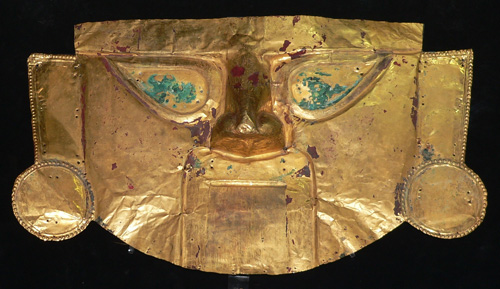 gold_mask_lima These masks within the idea of an identity projected to the generality fascinates me. It’s not very far from the street wear you were focused on. In both there is somehow the desire to match, to belong somewhere and somehow, to be accepted, integrated and adored. To be one and all. 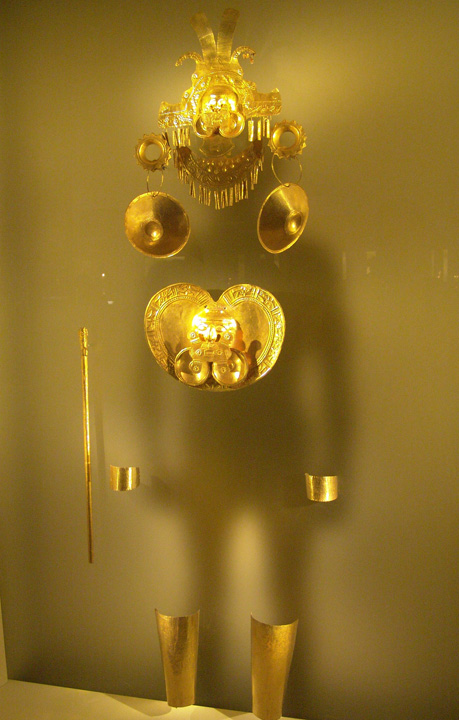 museo de oro, colombia Hi Leonor, This was from el Museo de Oro in Bogotá this past August. A lot of hardware… and the presence/absence of the figure articulated in the display. Over some years I took out from the bookshelf a book “The Antagonistic Link” which contains letters of Theo van Doesburg and Joaquin Torres-García. I bought this book on 1997 in Amsterdam while I was studing in the Rietveld Academie. I remember that I was captured by the sincerity and passion of their letters, how these two great thinkers of avant-garde movement with different backrounds were able to discuss about the meaning of the single word over and over again. How they had strong disagreemnets and they still tried to explain to each other ones points of view. It is very emotional book I enjoyed it very much, containing next to the correspondence of these two big men also interesting articles about their backround and the circle of artists they were involved with. It is certainly one of these almost blind purchases which turn to be very dear. I admire their works very much. Only now being involved with Grey Area I kind of realised that the whole book was a huge and great cooperation of curators and familiy members in Holland and South America too. I chose to show you some symbols by Torres-García as I find his theory very interesting and maybe this will inspire you too. I am quoting from the book. : Torres-García said: “Geometry and symbolism tend to be the artist’s natural mode of expression. First of all geometry because it is the graphic language of reason; then symbolism, because the symbol is also in fact a graphic idea. But there is another reason from the artist’s point of view,and this is of the greatest importance. The symbol in fact, unlike all other images, does not represent any other thing; the symbol is different: it represents itself. Because in the symbol, idea and form are the same thing; one and the same thing: it is the idea-matter, or matter-idea, whichever you prefer… If the artist is a creator of symbols it is because the symbolic form is not just something that exists within the rational structure, but also within the soul and in matter and it emerges from them made, as it were, of one piece; and this is why it has, in a sense a magical value, and why it operates directly on our spiritual sense, without requiring any interpretation or reading; and for these reasons as far as its form is concerned it has a value in itself. Maybe you know this book? Let me know what you think about T-G theory about symbols! Ketli Hi Again. Thanks for understanding my position. It’s all unstable right now and anything can happen! Let’s do what you said, see what comes up. Maybe we will be pleasantly surprised. The other night I watched a super cheesy movie from the 80s, called Dreamscape. I remember that this movie tormented me when I first saw it, when I was little. These images come from the beginning and it’s all about fire…..
Don’t worry, Sebastián! I can understand this state of mind… When you have some ideas, tell me. We could think about our project together… or by ourselves! … I’ll show you everything that goes through my head. I found this image of a phoenix and it seems she is being reborn in the bowl of the photo you posted…
Até a próxima! Em breve, espero…
Hey. Nice work. I like it. I got nowhere thus far and I am sorry for my lack of enthusiasm. But what I want to try is still in my head (candle brooch that you light in order to complete it, in other words ‘burn your own jewellery’ or ‘light your own jewellery’). How did you make the links? Can you make interlocking links, like a large chain? Could be funny to make a large chain necklace that is set alight. I also thought about the phoenix as something to work with as a symbol with, perhaps, wax and fire (I like what the phoenix represents, what we already talked about, rebirth, which is also what I think that whole gray area is about!). Hhhmmmmm. Until sometime in the very near future….Ciao Hi Mia, How are you???? Hope you’re feeling better. I think you will get the material today or tomorrow, I sent parts of my past, places or moments in my life. Since today I’ll be sending you some images from this new life. Have a great week Hugs Ale Greetings from Pori, Finland. A town where I have not been. Feels like being abroad. Seen an exhibition by Zineb Sedira in Pori Art Museum about identity and immigration. Look at http://www.poriartmuseum.fi/eng/exhibitions/ http://www.zinebsedira.com/ Hi Hanna, It has being a strange time the last weeks… I have spent most of the time a the hospital with an infection that they don´t realize jet where it is. And now in addition a got a flu. Not very exciting… I sent you a mail like a month ago, that I just found out still in drafts. I think the video is to big. Do you know how to compress it to be able to post it? I hope you are fine… Helena Hi Miguel it was nice to skype with you yesterday. Here I am sending you an image of the spoken cap!!! Not Swarovski crystals though… Keeping in touch, Leonor 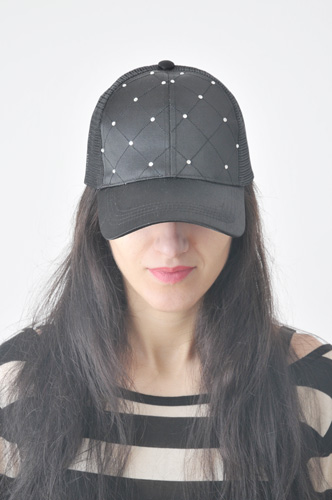 me and my cap, 08.12.09 … the inhabitants stretch strings from the corners of the houses, white or black or gray or black-and-white… …the strings become so numerous that you can no longer pass among them… … only the strings and their supports remain… … the labyrinth of taut strings… … pattern of strings… …spiderwebs of intricate relationships seeking a form. Hi Carolina, While you’ve being breaking down the layers or removing them to get to the core I’ve been playing with the idea of overlap. How would it look if our lifestyles were theoretically overlapped as layers, or our paths that we take in everyday life — what kind of pattern would it create?
|
|
|
Copyright © 2024 Otro Diseño | RSS |
|